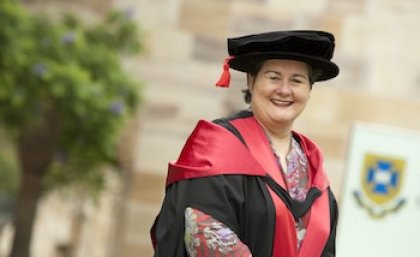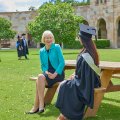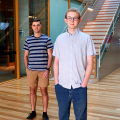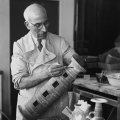
The University of Queensland (UQ) will celebrate a significant milestone today (Friday, 10 December 2010) when it awards its 9000th Doctor of Philosophy (PhD) degree.
Kaeleen Dingle, from the School of Population Health, will be awarded UQ’s 9000th PhD at a graduation ceremony at the St Lucia campus today at 2pm.
“Undertaking my PhD studies at UQ has been an overwhelmingly positive experience,” Dr Dingle said.
“The support I had from my advisors at UQ was second to none. They were inspirational and gave me the skills, encouragement and space to develop my research skills.”
Dean of the UQ Graduate School, Professor Zlatko Skrbis, said: “UQ is renowned for its research excellence and is committed to investing in and supporting research students.
“We have graduated 4000 PhD students in the past nine years, more than one a day, and are delighted that our 9000th student will graduate in our centenary year.
“The Graduate School is looking forward to building an even larger cohort of research students in the coming years.”
Dr Dingle’s research project explored the relationships between mental health, socio-demographic factors and family functioning during the transition to adulthood.
Her study was based on data collected from more than 7000 mothers and their children born at the Mater Hospital in Brisbane between 1981 and 1983 as part of the Mater-University of Queensland Study of Pregnancy (MUSP) longitudinal research study.
Dr Dingle’s findings included identifying correlations between socio-economic position and early parenting, as well young people who parent or partner early having a greater incidence of depression and anxiety than other young people.
“My research project aimed to find the groups that are more at risk of particular mental and anxiety disorders, and use this research to advise psychologists, GPs and other health professionals on those who may be more susceptible to these problems so they can be addressed early,” Dr Dingle said.
“Although a lot of what can happen in a person’s mental health can be attributed to early disadvantage, there are expectations and evidence to show that positive situations can pull children away from difficult situations.”
Dr Dingle’s pathway into a research higher degree wasn’t a traditional one. Initially trained in Rockhampton as a registered nurse, she worked as a nurse educator in Melbourne after gaining speciality qualifications in critical care and emergency nursing and a Bachelor of Education.
After 10 years as a nurse educator, Dr Dingle spent two years working with the Australian Red Cross and International Committee of the Red Cross in Sudan and Eritrea in East Africa.
On returning to Australia in 2000, Dr Dingle completed a Masters in Population Health (Tropical Health) at the School of Population Health. In 2005 she began her research higher degree with a public health scholarship from the National Health and Medical Research Council (NHMRC).
“I had enjoyed my Masters experience at UQ, and I knew that the research training I wanted gave me the chance to work with internationally renowned researchers that were experienced in longitudinal studies and life-course epidemiology,” she said.
Dr Dingle was supervised by Professor Gail Williams and Associate Professor Rosa Alati in the School of Population Health and Associate Professor Alexandra Clavarino from the School of Pharmacy.
She is now employed as a Research Fellow with the MUSP, which is currently conducting the 27-year follow-up of the mothers and will start the 30-year follow-up of their children early in 2011.
The MUSP, under direction of Principal Investigator Professor Jake Najman, took data from over 7000 mothers and their children born at the Mater Hospital in Brisbane between 1981 and 1983. Assessments and research were undertaken at 2 days after birth, and when the child was 6 months, and 5, 14 and 21 years old, with over 3700 young adults interviewed at the 21-year phase.
MUSP has received $3 million in funding from the NHMRC to investigate mental health, obesity and substance disorders, and Kaeleen will be part of the project as an Associate Investigator.
UQ Research Higher Degrees Background
The diversity of research being conducted at UQ has evolved considerably since UQ’s first PhD students, Dr Raymond Newton-Langdon and Dr Helena Whitehouse, were conferred on 30 April 1953. The 5000th PhD was awarded in December 2001 to Dr Michele Foster who is now a Senior Lecturer in UQ’s School of Social Work and Human Services.
Ranked in the top 1 percent of universities worldwide and renowned for its research excellence, UQ conducts more than 2330 research projects, has over 1500 research experts, and supports almost 4000 research students.
UQ has awarded almost 13,000 research higher degrees to graduates who have now become leaders in all areas of research, society and industry.
UQ’s research higher degree programs include the Doctor of Philosophy (PhD) and Master of Philosophy (MPhil). If you are interested in finding out more about research opportunities at UQ, contact the Graduate School UQ Advantage team at uqadvantage@gradschool.uq.edu.au or phone 07 3346 0508.
Media: Ms Carly Dengate (07 3346 0509, c.dengate@uq.edu.au) or Dr Jessica Gallagher (07 3346 0508, j.gallagher@uq.edu.au) at the UQ Graduate School











